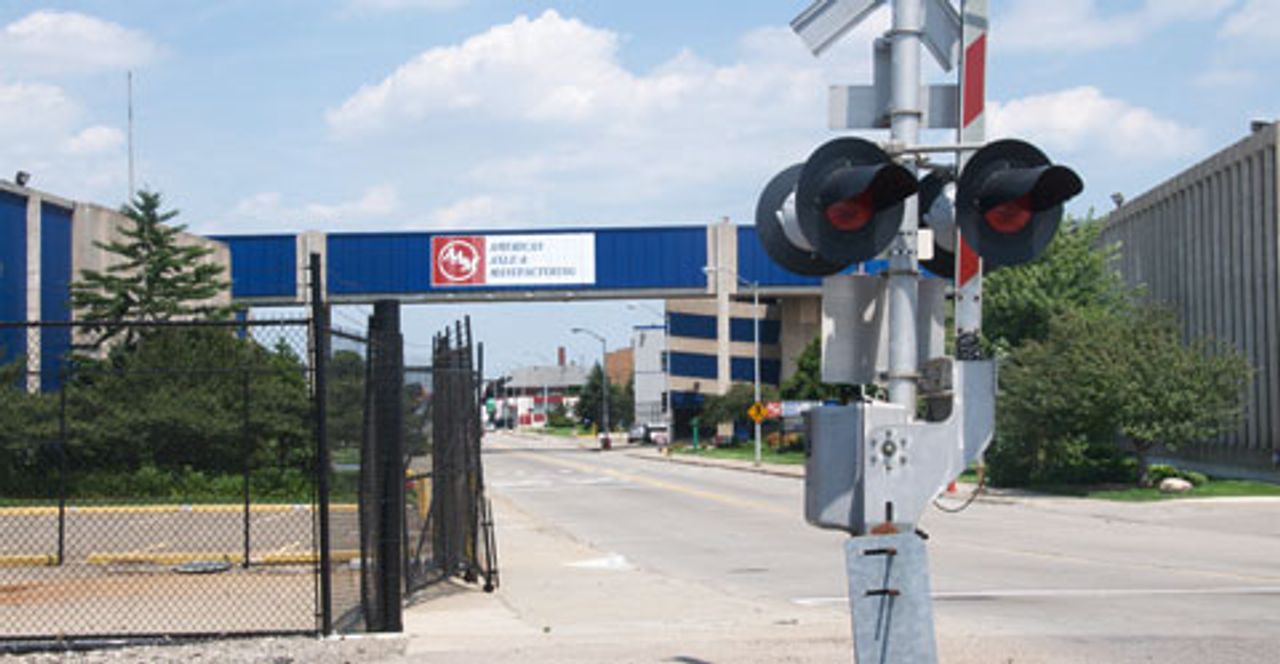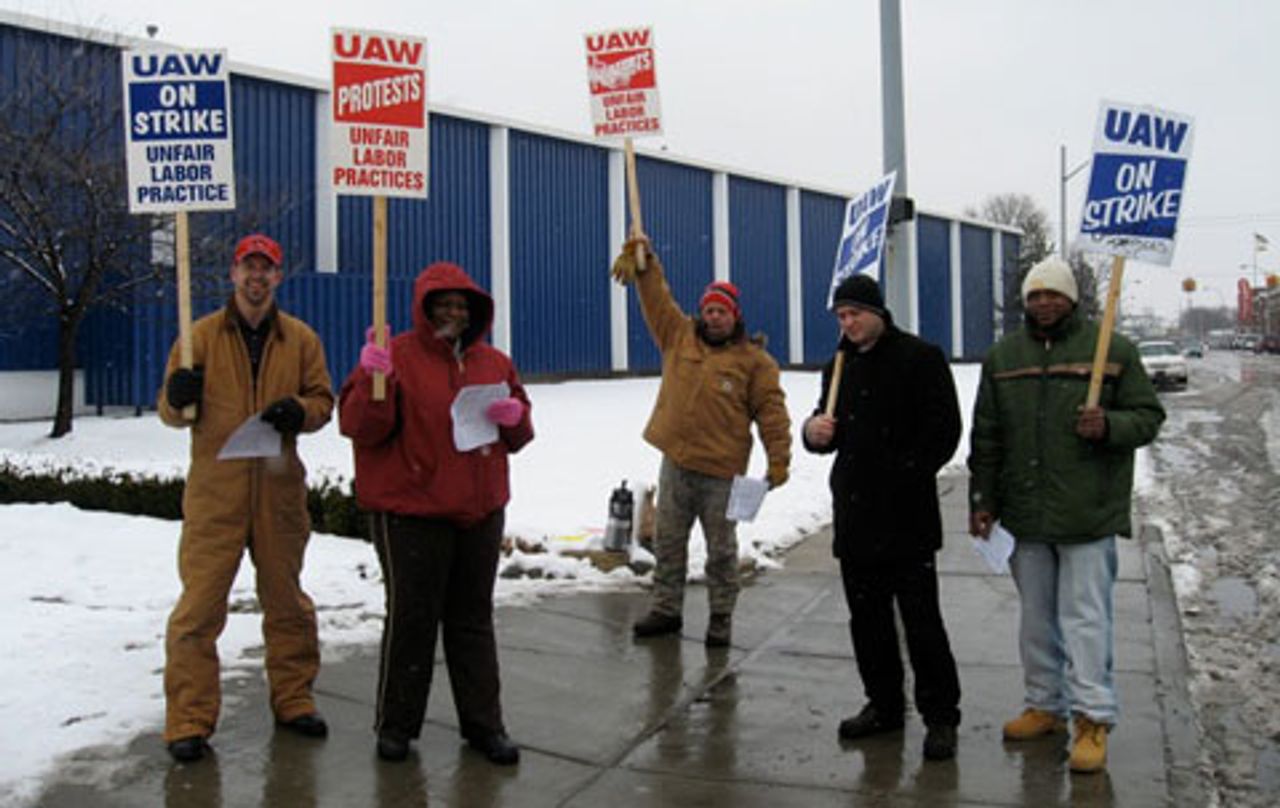 The American Axle plant in the Detroit enclave of Hamtramck
The American Axle plant in the Detroit enclave of HamtramckDetroit-based American Axle and Manufacturing says it will close its Detroit facility in February 2012 when the current agreement with the United Auto Workers expires. The closure will eliminate the remaining 300 hourly and salaried workers at the huge facility, which once employed thousands.
The shutdown announcement came at meetings held with employees last week following months of talks between the UAW and management over massive new concessions. The company was reportedly demanding a cut in total hourly compensation from $45 to $30 an hour. The UAW said it had agreed to a reduction to $32 an hour. A local UAW official said the union had agreed to a long list of cuts including modified work rules and the institution of alternative work schedules.
Workers contacted by the World Socialist Web Site said they had resisted pressure from the union for further concessions. American Axle said it wanted an agreement along the lines of that at its Three Rivers, Michigan plant where workers earn as little as $11 an hour in wages.
A spokesman for the company said it was closing the plant because it was not “market competitive.” He continued, “This facility was lacking in that and this was the unfortunate outcome.” An analyst raised American Axle’s rating from “hold” to “buy” and raised its 2012 earnings estimate following the closure announcement.
American Axle, which posted net income of $37.7 million in the first quarter of 2011, supplies components to auto manufacturers, particularly General Motors and Chrysler. It employs 8,500 worldwide and has plants in Indiana, Michigan, Ohio and New York. It also has wholly owned or joint-venture plants in Brazil, China, Japan, Mexico and Poland. The Detroit facility builds front and rear axle assemblies and steerage linkages for light trucks.
The company currently operates plants in Three Rivers, Michigan and Silao, Mexico that also produce axles for GM pickups. The company has not reported where it will shift production once the Detroit plant closes.
Following the plant closure announcement UAW Bob King issued a demagogic statement calling the planned shutdown, “Another example of corporate greed run amuck.” However, the UAW did not indicate any plans to oppose the closure. Instead it urged American Axle to resume negotiations on concessions.
 Pickets at the American Axle plant in Hamtramck, Michigan at the start of the 2008 strike
Pickets at the American Axle plant in Hamtramck, Michigan at the start of the 2008 strikeAs recently as 2007 the Detroit plant employed 2,200 workers. In 2008 more than 3,600 American Axle workers at plants in Michigan and New York State waged a bitter 3-month strike against concessions. The strike was isolated and betrayed by the United Auto Workers, which agreed to substantial wage cuts in exchange for a so-called buydown, a wage subsidy paid to older, more highly paid workers who agreed to stay on at lower wages. Pay was cut from $28 to $18.50 an hour, with so-called non-core workers receiving $14.55 or lower. Senior workers were also encouraged to take buyouts or early retirement. General Motors, which saw 30 of its plants closed during the strike due to parts shortages, put up $200 million to finance the settlement.
The betrayal of the strike set a precedent that was followed in the massive concessions that the UAW agreed to in 2009 during the forced restructuring of GM and Chrysler by the Obama administration. Following the 2008 strike American Axle shifted a large amount of work out of its Detroit facility. Only three of eight factories in the complex are still in operation.
American Axle is reportedly seeking similar concessions from workers at its Cheektowaga, New York facility. The plant employs 100 workers whose contract expires at the same time as the Detroit plant. American Axle closed its factory in Tonawanda, New York in the wake of the 2008 strike.
The Detroit axle complex has been in operation for some 90 years. It was purchased from General Motors along with other facilities in New York and Michigan in the early 1990s by a group of investors headed by former Chrysler executive Richard Dauch to form a stand-alone auto parts supplier. At the time of the 2008 strike Dauch told reporters for the Detroit Free Press he was determined to eliminate “The Detroit entitlement mentality,” that is any belief that workers should earn decent wages and benefits.
Trina Harris took the buyout after the betrayal of the 2008 strike. She told the WSWS, “I heard the plant was going to close in February. It’s like before, the company wants to shift production overseas for lower wages. The workers that are left have seniority dating back to 1994 and even earlier.
“The UAW has been completely bought off. During our strike the UAW sold out the membership. They wouldn’t tell us the truth. Afterwards hundreds of workers took the buyout; others saw their families break up and everyone lost lots of stuff. Our lives were completely changed. It was hard to find other jobs. Lots of us went back to school, but it will be hard for workers in their 40s and 50s to find work.
“After we were sold out it happened to the GM and Chrysler workers too. The UAW, Congress and Obama, they all went after those workers. I wasn’t surprised—there was nothing left. It’s like we’re being set back 100 or 200 years. How are young workers going to raise a family on $14 an hour?”
